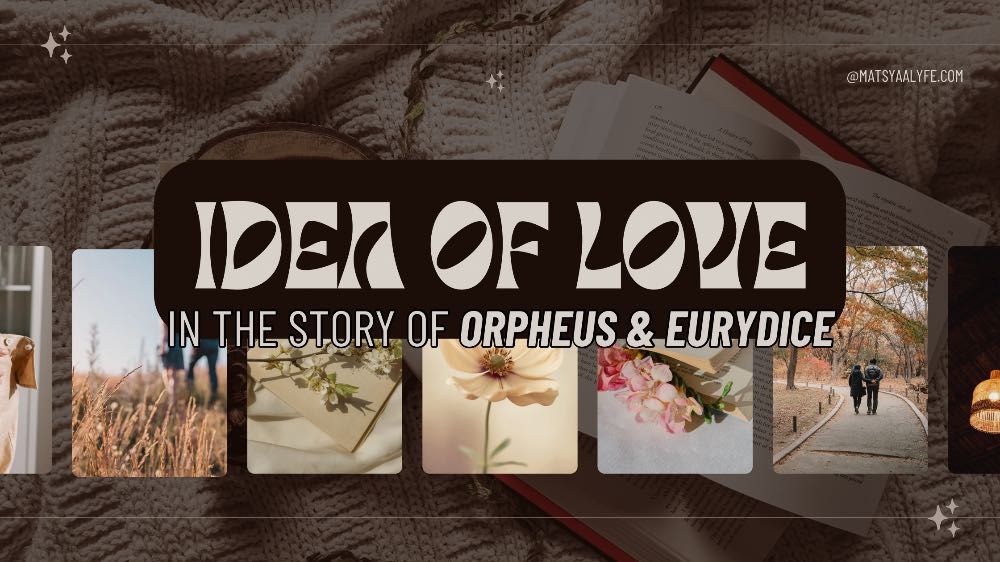Idea of Love in the Story of Orpheus and Eurydice
So, basically, this article was inspired by an Instagram post.
That’s just the way I function.
I read about old Greek tragedies on the internet, end up writing a poem about them, and then follow up the poem with a big life lesson.
I serve the lesson here to you. So, this is a guide for someone who wants to read deeply about the love story of Orpheus and Eurydice, even Greek mythology tales, and pursue further study in the beautiful story.
In this article, I’m talking about the idea of love in one of the most famous Greek mythology tales, the love story of Orpheus and Eurydice.
Table of Contents
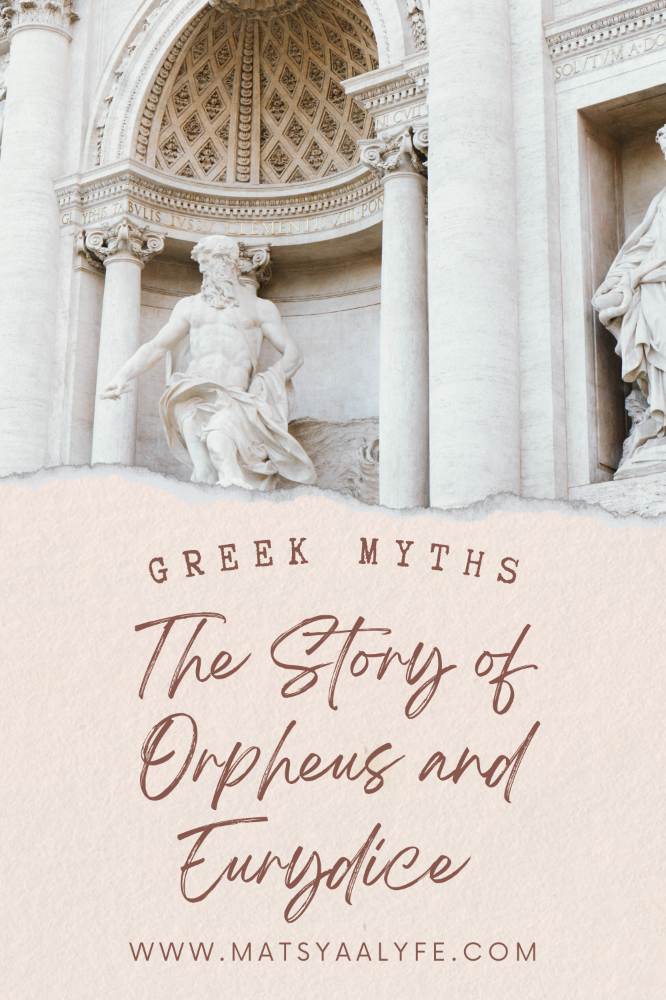
The Story of Orpheus and Eurydice
Do you know the love story of Orpheus and Eurydice?
It’s an ancient Greek myth about two lovers.
Eurydice was bitten by a venomous viper, which killed her. Orpheus followed her to the underworld, under Hades’ (the Greek God of death) rule, in hopes of bringing her back. Hades is adamant on following the rules of afterlife, but when his wife, Persephone insists, he gives Orpheus a chance.
“Play your lyre and walk out of the underworld. She’ll follow you. Don’t look back. Because the moment you turn around to look at her, she’ll descend back into hell.”
Seems simple, right? But it isn’t.
Orpheus was asked to keep walking out of hell to the earth and the spirit of his beloved Eurydice will follow him. But the moment he let the doubt enter in his mind—is she even there or not?—the moment he turned around to glance at her, she faded back into nothingness.
Even after having been given this chance of bringing his lover back from the clutches of death and the cruel Hades, he can’t ever live up to it.
Because the fates would never allow it.
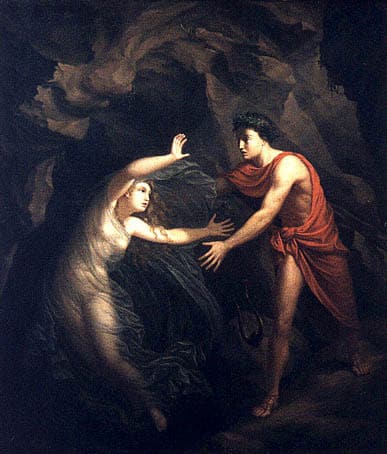
Because this is how the story of Orpheus and Eurydice always ends. They love each other, but it isn’t enough.
In every version of this ancient Greek myth, Orpheus ends up violating the one principal rule Hades had told him: don’t look back. He looks back. Always. Whether it is to make sure that Eurydice is still following him out, or whether it is in happiness that he has finally crossed the threshold that separates the world of the living from that of the dead (not seeing that Eurydice is still on the other side)—every version tells it in its own way, but the story remains the same.
He is never able to bring Eurydice back into our world. It’s like saying;
I love you to hell and (almost) back.
This is what it’s about. This is the idea of love. Given the affection that they both had for each other: her love called him down to hell, his love awoke her from death.
“In Your Opinion, Why Did Orpheus Look Back?”
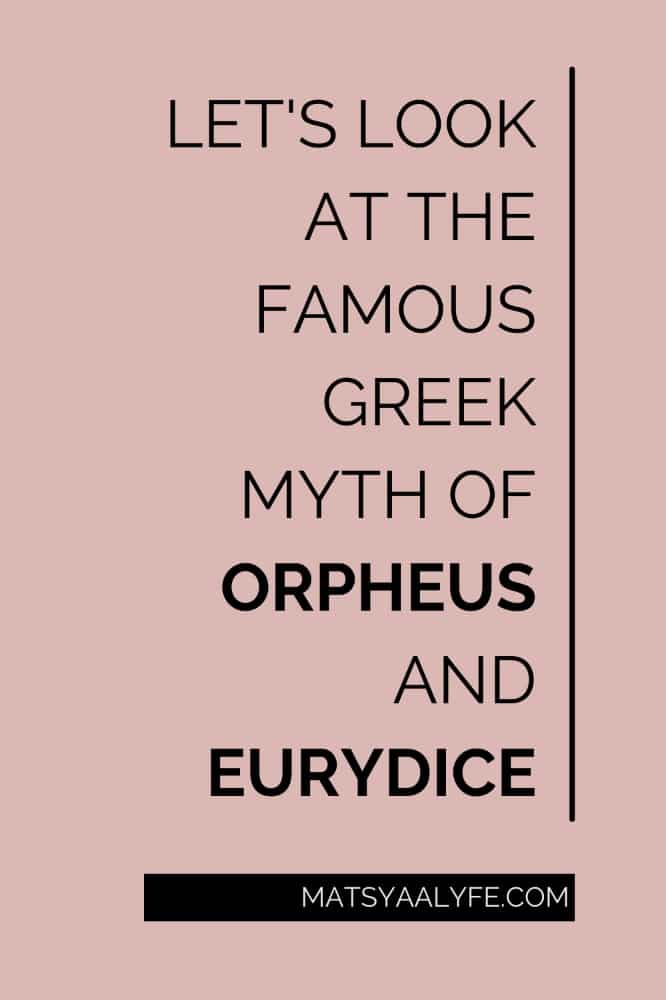
The Theme of Orpheus and Eurydice.
Can you see love? Can you see it in the form of the person who’s following you? The person who’s holding you? Is it the form that you love or is it the soul? The body or the spirit? The concrete or the idea?
Is love, itself, an idea?
Do you see love when you see them, or do you just feel it in their words, hug, in the way they are prepared to follow you blindly.
Here’s the thing. You can’t see love. Orpheus didn’t see her behind him but he loved her all the way. He loved her all the way to and all the way back.
Eurydice’s spirit saw him because she always walked behind, and she felt it throughout. She felt his love in his music, in the determination and steadiness in his step, she felt his love in that moment too, when he turned back to look at her—not being able to hold it off any longer—because she now knew that he loved her unconditionally.
But the love was felt in the air, above all else. In the hell which awoke to the sound of his lyre, his faith, his love. It brought a kind of liveliness they probably hadn’t seen a lot down there in the land of death and afterlife. This love was the product of a heart that believed. Knew. Felt?
Orpheus never saw her. But he loved her, right, undoubtedly, insurmountably. Eurydice never touched him. But she loved him, right? Same old way.
Now let’s digress a little from the topic and answer your burning question: why did Orpheus have to turn around? The lord of the underworld had helped him out, granted him the wish, if only he hadn’t turned around before Eurydice was safely back in the world of the living, we wouldn’t have been reading this as a tale of tragedy.
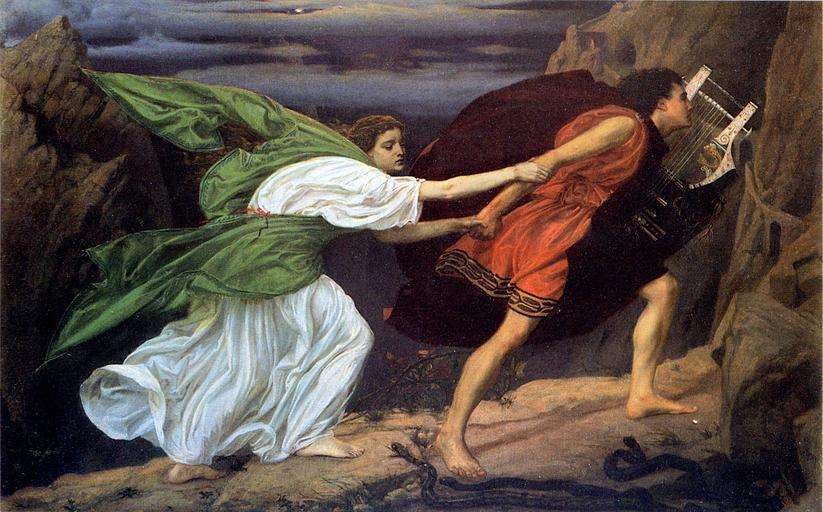
Why do all Greek mythology tales end with us sobbing behind our books, huh?
But…
Just think of it—how could he not turn back? I read somewhere that Orpheus’ challenge was impossible from the very beginning and it takes only a little time in this case to agree to someone else’s opinion so readily.
How can you not turn back? Isn’t the idea of love always about turning back?
I’m here, you’re here. I can’t turn my back to you.
I said all versions of the love story of Orpheus and Eurydice tell different tales. Because the moment he was happy that he had crossed over to the land of the living, he turned around to share his pleasure with her. Because the moment he felt he heard her stumble behind him (maybe it was just a trick), he turned around to make sure she’s alright. The moment he stopped hearing the sound of her breathing and her footsteps, he turned around.
He turns around, he turns around. He can’t help but turning around. He can’t help but care.
And he can’t stop himself from caring all of a sudden, even though it’s all too clearly a trap of Hades and the fates are cruel in handing them this destiny, he knows all of it all too well. But what instead are they supposed to do?
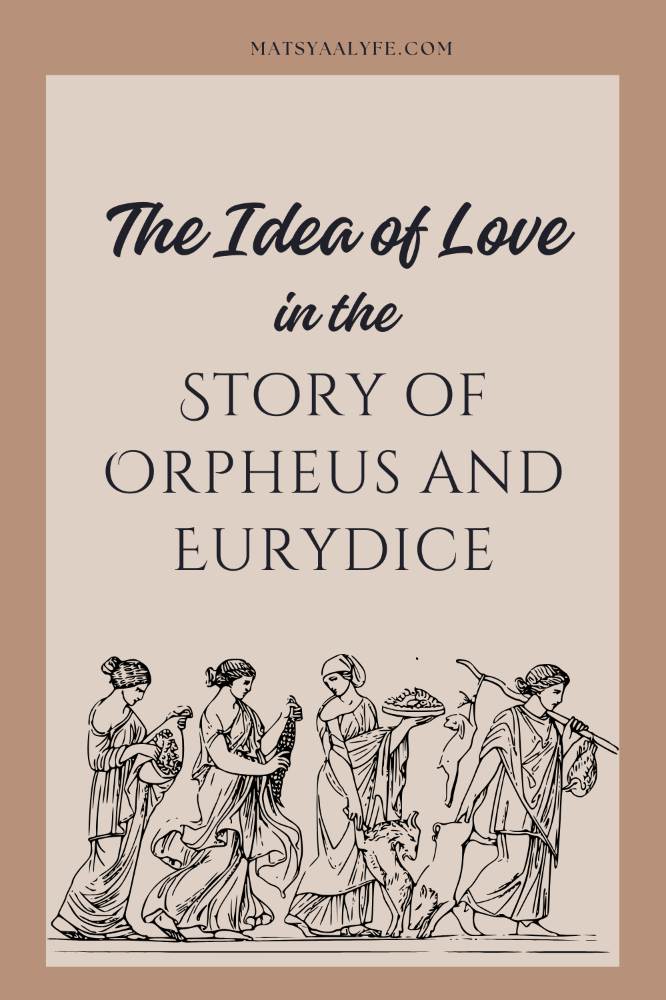
He loved her, that’s how it begins. He loved her, that’s how it ends too.
Now if we just put our spotlight on Eurydice for a second.
Just that she had been loved by Orpheus for all that time, it’s enough for her. He turned back to look at her and the moment their eyes met, she must’ve found herself smiling because she was blessed to feel his love and to hear his music for one last time.
Eurydice, dying now a second time, uttered no complaint against her husband. What was there to complain of, but that she had been loved?
-Ovid, Metamorphoses
The fact that she didn’t rebuke him, that she forgave him instead and then quietly succumbed to her place in the underworld, is enough of a testimony to her complete acceptance.
What then? Orpheus had to return to the world of living, alone as he had left, alone he returned, knowing he couldn’t go back to the underworld again. No mortal entered Underworld twice, in fact, Odysseus, the resourceful hero from The Odyssey, is the one who does.
The Story of Orpheus and Eurydice in Popular Media
A god can do it. But how, tell me, could
a man follow him through the narrow lyre?
His mind divides. Where two heart-roads cross
there can be no temple for Apollo.–Sonnets to Orpheus, by Rainer Marie Rilke, trans. Edward Snow
Up for reading a novel just about the love story of Orpheus and Eurydice? Check out A Song for the Underworld, by Adam Alexander Haviaras. It’s a beautiful retelling of the epic tale. Enchanted Fire, by Roberta Gellis is another such book.
Ancient Greek tragedies have a way of drawing you in.
Greek mythology tales are fun to read.
Be it the epic The Odyssey and The Illiad by the greatest playwright in the western world, or be it the tragedy that their characters felt when the fates played out in their own way, you read about them and feel the uniqueness in literature flowing through your veins.
Let’s talk about a different Greek myth next time! Until then, keep loving.
Suggested Reading:
3 Philosophical Paradoxes That Will Have You Rethinking Truth and Reality
